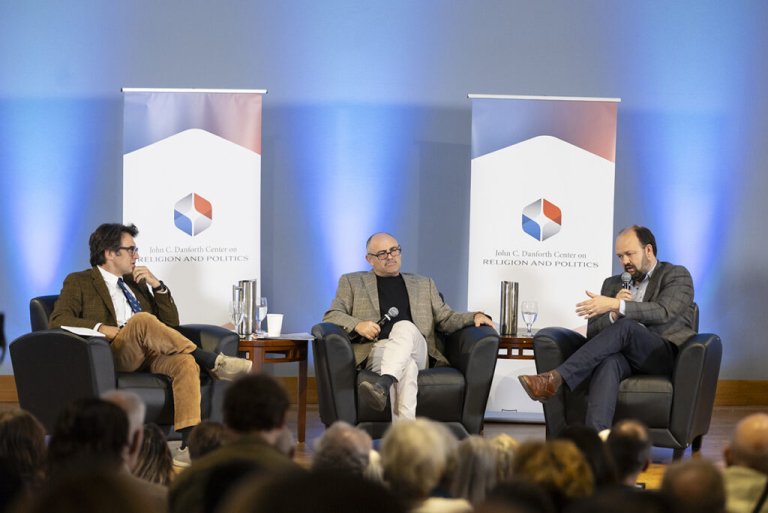Zuckerman Spars with NYT Columnist on Faith and Secularism
Pitzer Professor Phil Zuckerman and the New York Times’ Ross Douthat Tackled the Nature of Belief in a Recent Public Conversation

More than fourteen years ago, in 2011, Professor Phil Zuckerman launched something unprecedented in the United States: a secular studies program. Guided by fearless innovation that’s nurtured at Pitzer, Zuckerman set out to help students understand what ethical behavior might look like when it isn’t tied to religious belief.
Over the years, that program has evolved. Today, its focus is less on challenging religion and more on understanding the dynamic relationship between the secular and the sacred.
Recently, Zuckerman took part in a public dialogue with someone on the opposite end of that spectrum—New York Times columnist Ross Douthat, whose latest book, Believe: Why Everyone Should Be Religious, argues that religious faith should be a necessity for all. The two met onstage at Washington University in St. Louis’ John C. Danforth Center on Religion and Politics. They offered audiences a thought-provoking, civil exchange on what belief and doubt mean in America today.
Mysteries = God?
For Douthat, religion for the past 20 years has been “in a swift cultural retreat” because of the emergence of the New Atheists, a group of journalists, public intellectuals, and scientists who, since the September 11 attacks of 2001, have argued that “religion is destructive … and we’d be better off if we sloughed off its burdens.”
The polarization and toxicity we see in the world today, he added, show what has taken hold in this retreat, which is why his book asks readers to reconsider religious belief. He suggested that humanity’s ability to understand the universe’s complexity is compelling to him as a sign of a divine creator.
“Our capacity to reach upward and understand from below seems to track reasonably well with the biblical concept of a creator god who made us in his image,” Douthat said, citing humanity’s “godlike capacities” regarding intellect and consciousness.
In contrast, Zuckerman suggested caution and reserve regarding things that are considered mysteries.
“What a precarious argument,” Zuckerman said. “Is Ross saying if neuroscientists can’t explain everything about consciousness, his god exists? But if they can explain everything about consciousness, God doesn’t exist? Yikes. I would argue that the most sane, rational and reasonable position to take is that, when we encounter a mystery, remain in a state of unknowing. Be humble. Be agnostic. Say: ‘We haven’t figured this out. We don’t know.’ It’s much more rational and reasonable to simply admit we don’t understand everything than to say, ‘Ah, it must be the Lord.’”
Watch the full event:
Pitzer’s Leadership in Secular Scholarship
Like his appearance a year ago at the Oxford Union for a similar discussion, Zuckerman continues to represent a program in secular studies that remains the only one in the U.S. Asked in a post-event interview if it feels lonely that Pitzer hasn’t been joined by other schools, he said his response is mixed.
“Is it lonely? Yes and no,” he said. “While ours remains the only such program, there have been so many parallel endeavors that have emerged since we came on the scene.”
Those developments, Zuckerman said, include the creation of the Nonreligion and Secularity Research Network as well as new academic, peer-reviewed journals on secular studies. He also pointed to the establishing of a professorship of secular and religious studies at Utrecht University (the first such designation outside of Pitzer) as well as ongoing conferences around the world that are encouraging indications that other higher education institutions may soon follow Pitzer’s example.
Zuckerman said the event was enjoyable and positive, and that he found Douthat to be a “polite, reasonable, decent, thoughtful” person who isn’t advocating “to impose his religion on others through political might or violence.”
He added that taking the secular position in such conversations presents a variety of challenges.
“It is always hard to argue against religion or the existence of God because many people take it personally and feel attacked and the atheist often comes off as a jerk. I tried hard to resist that approach,” he said. “Not sure if I succeeded.”
The Danforth Center event took place on the heels of another recent debate in which Zuckerman participated at Jessup University in Sacramento. He’s currently editing the Oxford Handbook of Apostasy and Deconversion, which will be out in 2026. He will deliver a talk on the subject in Calgary next spring. “I’m also currently writing a new book,” he added, “and it’s about—you’ll never guess!—secularism.”
News Information
Published
Author
Nick Owchar